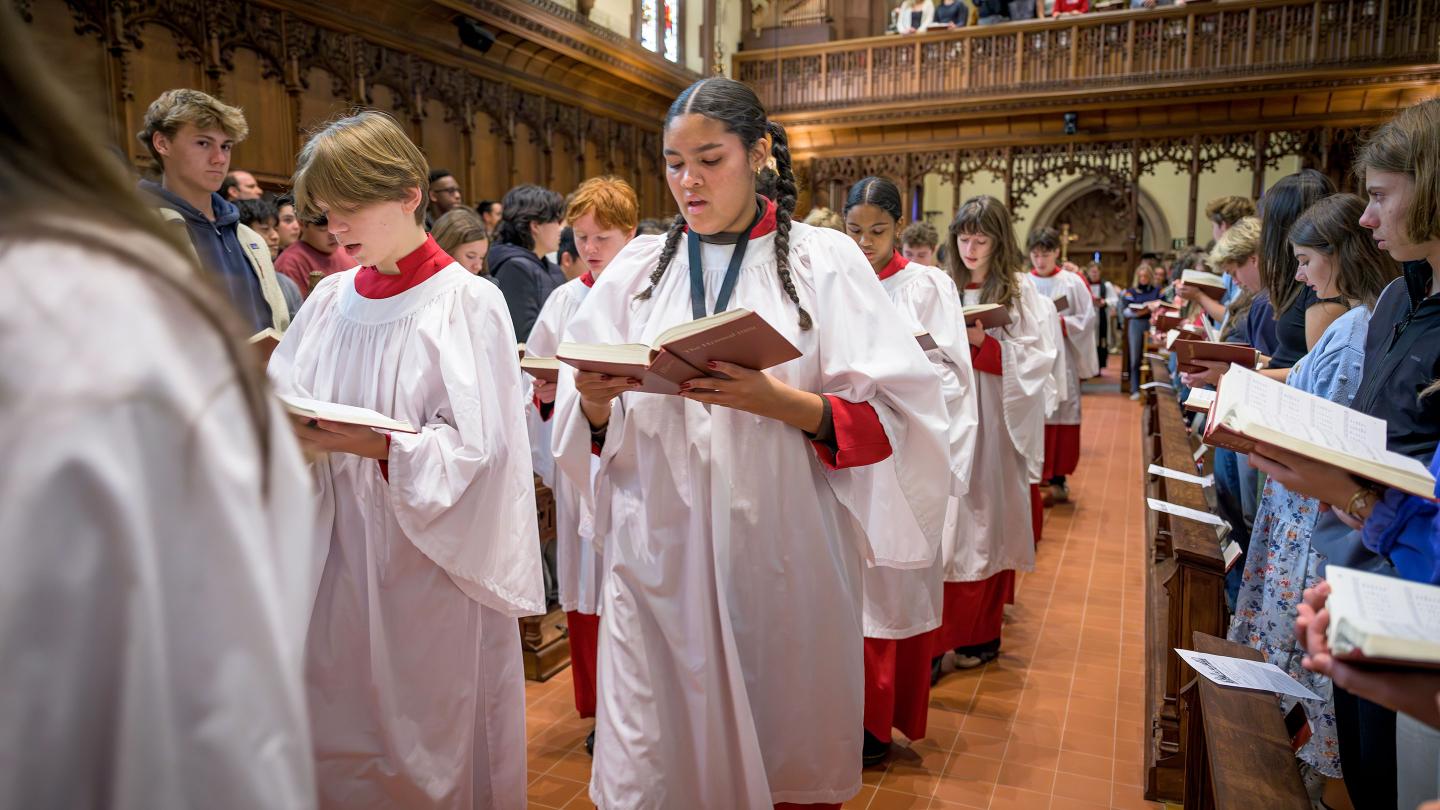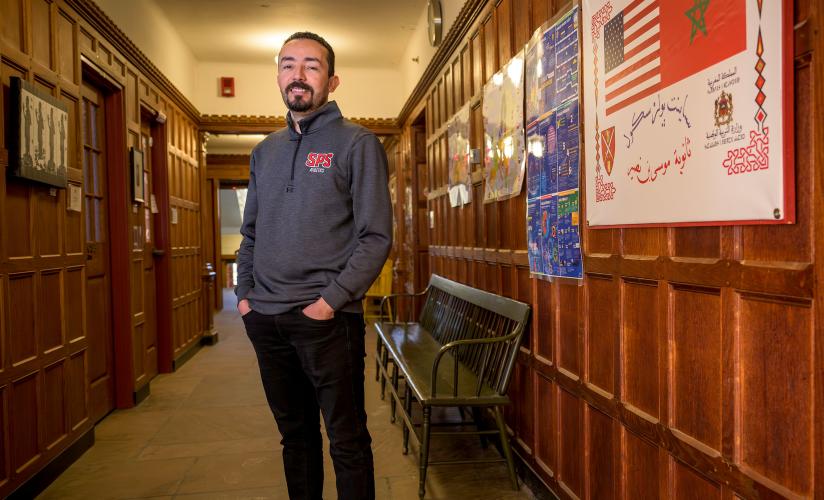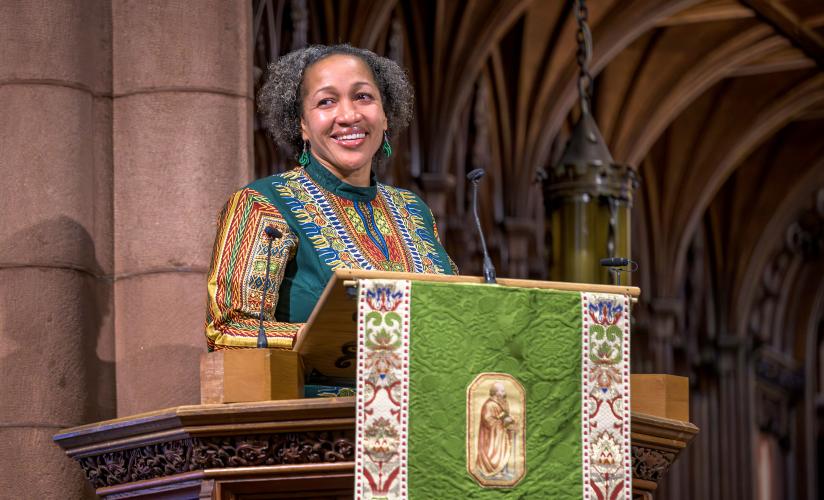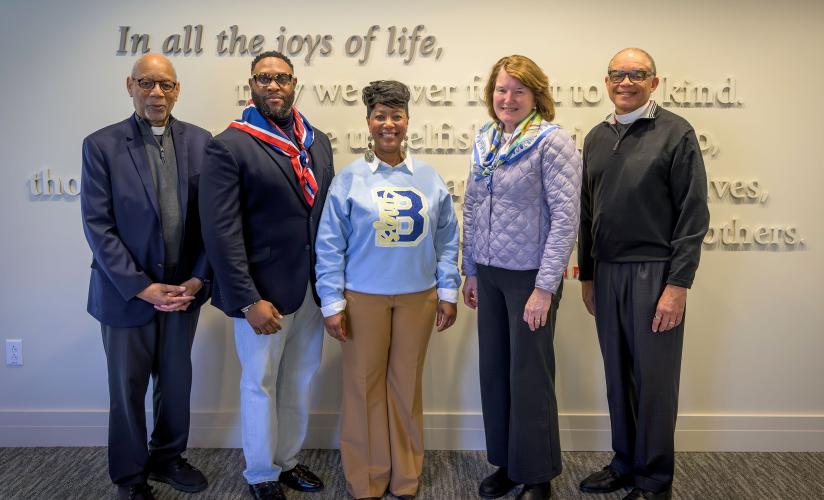

Rector Kathy Giles welcomes students to Winter Term with encouragement to seek light in the darkness.
Welcome back and welcome to Winter Term. In addition to being a busy time full of concerts, performances, games/matches/meets and tournaments, this is a special time of year in New England and here in New Hampshire as we look forward to and dread the arrival of winter. Specifically, we look to the northern winter solstice, Dec. 21, when the sun appears lowest in the sky and we experience the least daylight hours given the earth’s angle of rotation around our star, the sun. While there is a relatively simple scientific explanation for this phenomenon, for thousands of years humans have celebrated and dreaded this time, a time of darkness and often cold, when the warmth of elusive light is spiritual and psychological as well as physical. Today’s opening sentences are remarkable in the common ways Judaism, Christianity and Islam revere light — spiritual light, analogous to physical light in ways shared by virtually all traditions of curiosity and orientation to goodness in divinity, throughout thousands of years of human history, despite ever-present darkness, despite suffering, despite confusion and lack of clarity and chaos. The answer to it all, in spite of it all, is that we all seek light.
Today’s reading from the commentator David Brooks notes the Athenian or ancient Greek tradition of humility and prudence that grew up in a different understanding of divinity, independent of Abrahamic faiths — a Western intellectual and moral tradition that values cautiousness and prudence, the opposite of impulsivity, in seeking light. Brooks holds this tradition side by side with the Abrahamic faiths, the faith springing from Abraham — Judaism, Christianity, Islam — that share the tradition of “audacity, openness, and care” in seeking light. These faiths share the courage it takes to believe what one cannot see; the openness to learning; and the care — and the courage and daring it takes — to order and orient oneself towards care for others.
These faiths and traditions are part of the broader human quest towards the concept of enlightenment — in the Buddhist tradition, “the experience of true reality, an awakening through which one can understand — comprehend — the true nature of things; the pinnacle of human development and potential.” In the Hindu tradition, enlightenment is achieved by following the path of good deeds, the path of devotion, and the path of knowledge.” And finally in later Western intellectual thought, the Enlightenment period in Europe that proposes the use and celebration of reason, our human power to understand the universe and improve the human condition with the goals of knowledge, freedom and happiness.
Better thinkers than I have written a great deal about how all of these ideas about light and enlightenment are connected, and connected they are, whether you have a faith tradition or no faith tradition. It’s a fact of our lives, throughout our histories: when we are in darkness, we seek light.
What do we hope to see when we seek light in darkness? Last month, Mr. Pacelli and I did a webinar with two alumni astrophysicists who spend their professional lives looking at images from the Hubble telescope and the James Webb deep space telescope, photos of an infinite number of galaxies — like to ours in that we are a galaxy with a sun, but unknowable given the way the limits of time and space apply to us. As scientists, our alumni astrophysicists analyze those images and that data in seeking to further our understanding of time and space — rational brains and systems trying to forge rational answers to deep, deep mysteries, seeking to comprehend, seeking enlightenment. For me, those images — the light in the infinite enormity of cosmic darkness — defy rationality and bend my mind. Many of you have had this experience using our telescopes here, but one can also have a version of this experience just looking up at the clear winter night sky in the coming nights when the sun goes down early and the stars are visible in our comings and goings around campus as we tend to our responsibilities, our hopes and our caring. In relation to the lights we can see, assisted and unassisted, from space, yes to humility as we comprehend ourselves as nano specs and nano seconds in this beautiful, mysterious, awesome cosmos. If one gets to choose between being audacious or afraid, given that perspective, I vote for audacity — and openness, and caring, and curiosity in continually seeking enlightenment in all of its meanings.
During this season of the year, we have a special reverence for the light in which we can really see each other — light we have to seek to find others and to find our way, and light we have to show others to help them find us and find their way. Let your light shine, we are told; don’t hide your light from others. OK — but then what? Can we share light? Does my light need to be better or stronger than your light? Does my light need to be blinding? Take the metaphor up for a moment and think about the kind of light that works best in finding one’s way.
And what does it mean to claim the light as one’s own? Would we really claim, “this is my sun; this is my star”? How ludicrous. One does not even need an experience with the astrophysicists and the deep space photos to know how truly insignificant we are in the vast-beyond-rationality cosmos — and how significant we are in the vast-beyond-rationality embrace of the Love Divine, there for us if we seek it, there for all of us all the time, to share and be shared. This is my belief; this is my perspective; this is my experience — this is my sun, this is my star — how ludicrous in isolation, defended in isolation. Do we matter much if we remain focused only on ourselves, our own ideas and beliefs — do ours matter much if we define everyone else as other, as lesser, as our adversary or opponent or enemy? What an incredibly cold, distant way to view oneself in a dark cosmos and how easy it becomes to entertain hatred and anger and fear in such loneliness and isolation.
In the context of world events, over the past weeks since we heard Dr. Bruce Duthu from Dartmouth, I have thought continually about his important points that close the spaces between us and bring together these ideas of humility, prudence, audacity, openness and caring. Think back to his Chapel talk in early November, when Dr. Duthu described his approach as follows:
If I approach my encounter with new people who are currently strangers, but are soon to become friends, if I approach that encounter in a spirit of openness, in a spirit of what do I have, what can I learn from the encounter, you can create the space for understanding. But if I start that encounter injecting my own views, my own values, my own priorities, there’s very little space for mutual understanding to meet in that exciting complex space between us.
As humans, that’s where the richness, but that’s also where the complexity takes place. It’s in that, what we call the interstices, the spaces in between. What happens in the space in between? It takes two people to create that space of understanding. If we inject a bit more humility, which I think is the opposite side of the original renewable fuel, love, I see those two as interrelated. Then I think we are on the path or can regain the path of understanding.
Seeking understanding, seeking enlightenment, seeking the light — looking beyond ourselves to others and thus creating this space in between for understanding and relationships — leading with curiosity, humility and the renewable fuel of the Love Divine makes all the difference in whether we see the darkness as frightening or whether we are comforted by the light that guides our way. Think about it when you look up to see the stars and think about what their light means. Are you terrified by the darkness and magnitude and loneliness, or do you choose to love and admire the light? Four hundred years ago, the Italian astronomer Galileo, committed to reason and science in the seventeenth century, is reported to have said, “I have loved the stars too fondly to be fearful of the night.” Choose to love the light on these brilliant early days of winter. No one owns the light; we all need the light; we all have light to share — humility, prudence, audacity, openness, caring. We have a great resource for finding our light in our school prayer — in kindness, unselfishness in extending our friendship beyond our immediate friends, thoughtfulness of those less happy than ourselves, and eagerness to bear the burdens of others. Read it; love it; live it. Thinking globally, acting locally, let’s lead with love in harsh times. This is the light we have and the light we can share.
May it be so, and amen.



